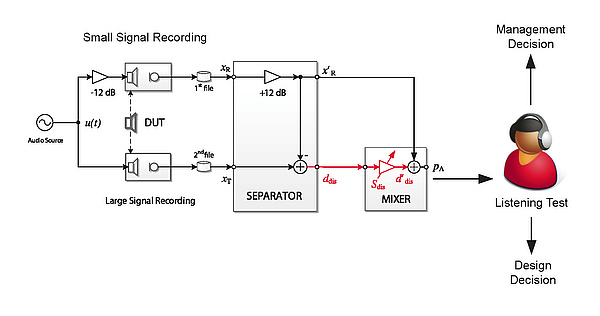Difference Auralization (DIF-AUR)
This module is deprecated. Please contact support(at)klippel(dot)de for details and potential new products in our pipeline.
- Automatic alignment of input signals in time
- Isolation of difference signal (no model is employed)
- Scaling of difference signal to enhance or attenuate distortion
- Automatic leveling of auralization output
- Export of auralization output to WAVE files
- Distortion analysis and frequency domain analysis
Benefits
- Combines subjective and objective evaluation
- Isolates all kinds of regular and irregular distortion (also rub & buzz)
- Exported files may be used for listening tests or perceptual simulation
- Sensitization of listeners to defect symptom
- Communication of sound quality to nontechnical colleagues to define target performance
- Determine critical test signals
The DIF-AUR module separates the distortion by calculating the difference between a test signal xT and a reference signal xR after adjusting both signals' gain and time delay. This auralization technique requires no transducer modeling but can also be applied for recording the output of the device under test (DUT) in the small signal domain (reference) and in the large signal domain (test). This is important for auralizing distortion generated by nonlinear cone vibration and impulsive distortion generated by a rubbing voice coil, buzzing doors, loose particles and other defects.
Specification
Requirements
dB-Lab software
PC
high quality reproduction system (headphones)
Related Information
Application Notes
AN 67 Auralization of Signal Difference (deprecated)
Literature and Papers
Auralization Part 1
Perceptual and Physical Evaluation of Guitar Speakers
Standards
International Electrotechnical Commission
IEC 60268-13, IEC 61305-5, IEC 62458
International Telecommunication Union
ITU-R Recommendation BS. 1116, ITU-R Recommendation BS. 1534-1
Patents
USA: 8,964,996B2

